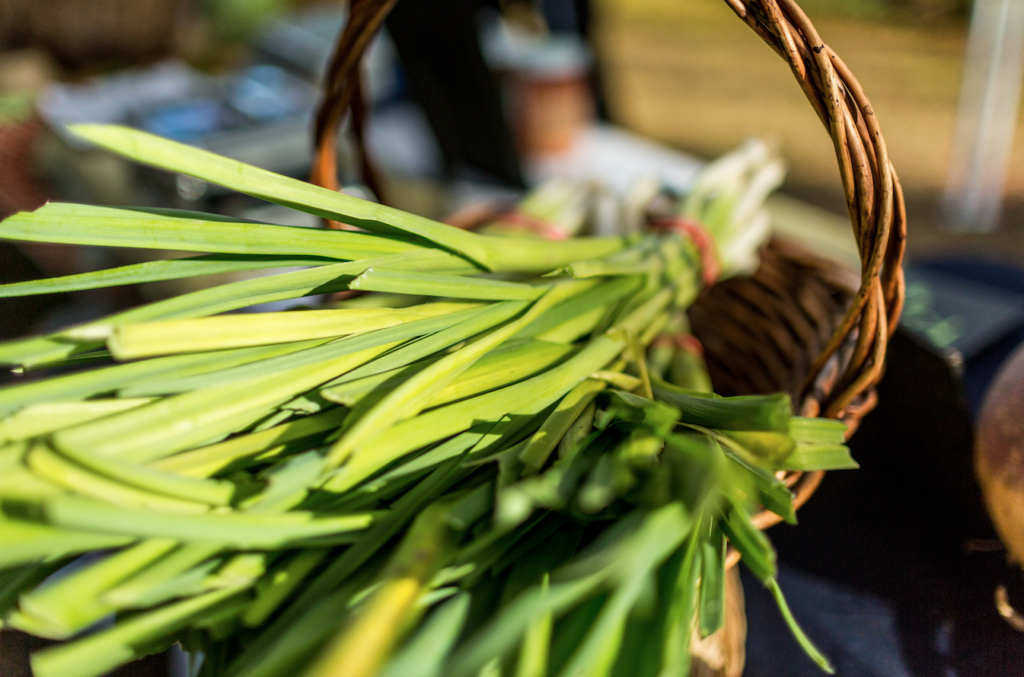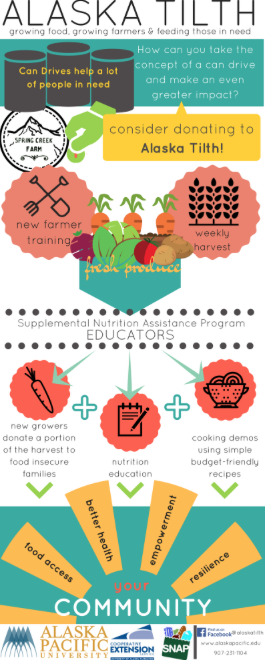Early each week, the farmers at Spring Creek Farm on Kellogg Campus walk through the fields to assess.
First, they look to see which vegetables are at peak maturity and what produce can afford to sit on the vine for another week. Then, they decide who gets what in the community they serve.
Signs of the produce manifest all over campus: at Wednesday Farmers Market, in the Farm to School cooler, on the menu in the dining hall or in CSA shares. But it’s not just the APU denizens that enjoy the fresh grown grub. A portion of the produce also benefits the neediest Alaskans through a program called Alaska Tilth.
The program is a collaboration between APU and the University of Alaska Fairbanks Matanuska Experiment Farm and Cooperative Extension that aims to reduce food insecurity in the Matanuska-Susitna Valley through donations of fresh produce.
“Not everyone can afford fresh produce and in Alaska in particular the cost of produce is higher, so farmers aren’t able to sell their products at a range where many Alaskans can afford it,” said Megan Talley, one of the farmers at APU’s farm. “This program makes it accessible to them.”
Beyond donating the vegetables to those in need, Alaska Tilth’s goals include educating recipients on nutrition and healthy cooking practices.
“Many food pantries receive donations of produce, so we want to make sure recipients know what to do with things like kale and rutabaga,” Talley explained.
The partnership was forged because both schools had mission statements involving creating a more resilient food system in Alaska. Because it was such a big task on a limited budget, they agreed to join forced to work towards the goal.
Originally, UAF allowed APU to utilize four of their vacant greenhouses. Then partnership brought in the Cooperative Extensions Family Nutrition Educator who had worked with low income families eating healthily on a budget.
Soon they learned that the Nutrition Educator had a limited budget which prevented her from purchasing fresh produce for cooking demonstrations. Together, a proposal was developed that would allow APU to utilize the greenhouses for a small fee in exchange for a donation of 10 weekly CSA shares to the Family Nutrition Educator to use during demos.
“Thus Tilth was born,” Talley said. “So it is part food donation, part new farmer education and awareness building, part working together with our neighbors to create resiliency.”
During the 2015 season, Tilth’s first year, the farm donated approximately 2,000 pounds of their produce and helped get 900 pounds of potatoes from the Plant Material Center (potatoes that would have otherwise stayed in the ground) to a local food pantry. Roughly 700 people received the goods and 220 nutrition education classes were hosted, reaching even more people. The following year, they donated 2958 pounds of just their own vegetables.
Fresh produce can help combat a myriad of diet related health issues, such as heart disease and diabetes, which Talley explained, disproportionately affects low income people in the community, in part due to the low cost of processed foods.
The food donated to Tilth benefits all the places their Nutrition Educator frequents. Currently she is at the Lutheran Church food pantry in Wasilla each Wednesday doing demos and distributing produce. She also has relationships with the Palmer Senior Center, My House, and the Women’s Shelter, whom she regularly brings Spring Creek produce to.
“We hope that by introducing local produce, along with how to use it, to folks who have not had access in the past, they will be able to start getting more fresh foods into their diets and will be able to lead healthier lives,” Talley said.


